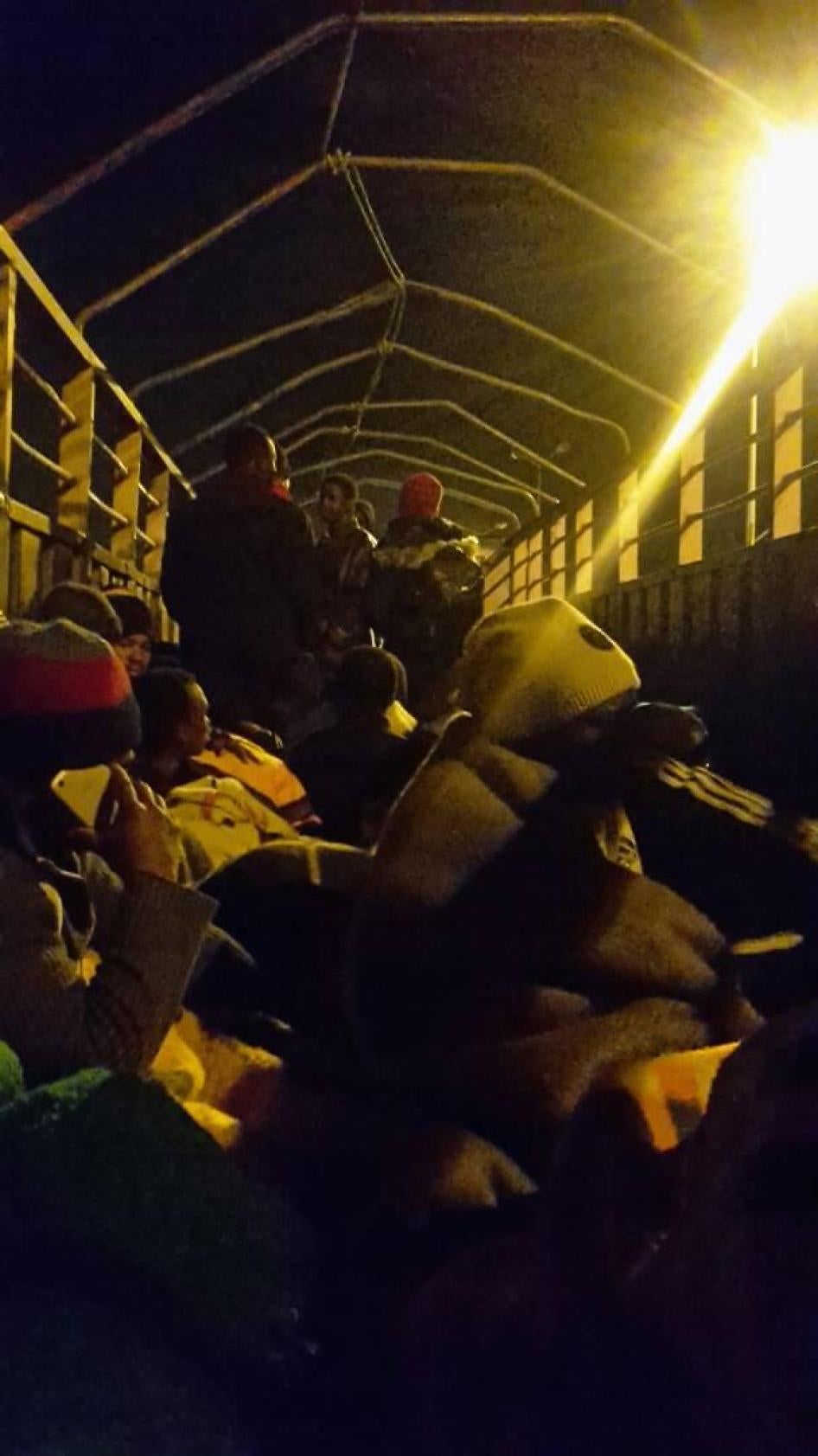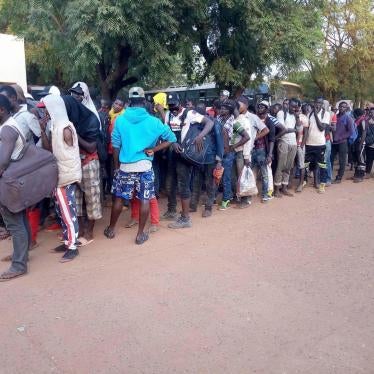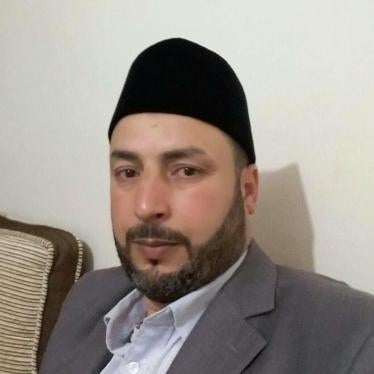(Tunis) – Algerian authorities have rounded up hundreds of sub-Saharan Africans since January 2018, including women and children, expelling many of them to Niger, Human Rights Watch said today. The authorities have deprived those arrested of their right to challenge their detention and possible deportation, people who were arrested told Human Rights Watch.
As in earlier waves in October 2017 and December 2016, security forces rounded people up on the streets or at construction sites, where many work. Most, if not all, were taken to a facility in Zeralda, a suburb of the capital, where they spent one to three days in crowded halls with no mattresses and little to eat, people who were arrested told Human Rights Watch. Security forces then bused the migrants 1,900 kilometers south to a camp in Tamanrasset. In the previous waves, they took some of the migrants by trucks to Guezzam, a town near the border, then over the border into Niger.
“Algeria is rounding up and deporting migrants in a degrading way and depriving them of the right to have their cases reviewed on an individual basis,” said Sarah Leah Whitson, Middle East and North Africa director at Human Rights Watch.
A local activist who asked not to be named said that round-ups of hundreds of migrants occurred on January 24 and on February 10. The overall number of those expelled in 2018 is not known. The International Rescue Committee (IRC), which operates an assistance program for migrants in Agadez, Niger, estimated the total at 3,000 since the beginning of 2018, with 500 since February 10, mostly from Niger, and small numbers from Nigeria, Cameroon, Mali, and Guinea.
Trusted sources in Algiers told Human Rights Watch that those detained in January and February included 20 refugees and asylum seekers, among them two minors. Authorities released some after ascertaining their status, while others escaped during their transfer to Tamanrasset. The whereabouts of at least two is unknown.
On February 13, Human Rights Watch reached three men by phone who were being held in Tamanrasset. They separately described how the police detained them without giving them an opportunity to retrieve their documents or savings. They said the authorities did not screen them to ascertain their situation or refugee status, provide information about their rights, or allow them to contact the consular representatives of their country of origin.
They said they were held with hundreds of other people in Zeralda, 30 kilometers from Algiers, where they were made to sleep on the floor and given only biscuits and bread to eat for two days. They said the detainees included Nigeriens, Malians, Cameroonians and Ivorians, and that there were women and children among the detainees.
The three said they either saw gendarmes beat others or were themselves beaten during their transfer to Tamanrasset. They described the conditions in the camp in Tamanrasset as inhumane, dirty, and overcrowded, with detainees going an entire day without food.
Algeria has the power to control its borders. It can remove people not in the country legally who do not have refugee status or pending claims for protection, or do not have strong human rights claims not to be removed, including consideration of the right to family life. However, Algeria should give each person an effective opportunity to challenge their removal and to consider their individual circumstances. It should not subject migrants to arbitrary detention, or any form of inhuman and degrading treatment.
As a party to the 1951 Refugee Convention and the 1987 Convention against Torture and Other Cruel, Inhuman or Degrading Treatment or Punishment, Algeria is barred from forcibly removing any refugee or asylum seeker to a place where they would face a threat of being persecuted, or anyone else to a place where they would face the risk of being tortured, or subjected to inhuman and degrading treatment. The claims of anyone expressing such fears should be examined in full and fair procedures while the person remains in the country.
Algeria is also a party to the International Convention on the Protection of the Rights of All Migrant Workers and Members of their Families, which prohibits collective expulsions of migrant workers and their families and requires governments that are party to the convention to examine and rule on each potential expulsion individually. The convention applies to all migrant workers and their families, irrespective of their legal or work status.
Migrants should only be held in administrative detention on an individual basis, in full compliance with due process rights and procedural safeguards for the shortest possible period, and only as a last resort. While detained, they should be able to communicate with their families and have access to UNHCR, the United Nations refugee agency and consular missions. Detention conditions and treatment should fully comply with international human rights standards.
Human Rights Watch interviewed three men who were arrested during the current roundups. They are not identified by their real names for their protection.
Slimane
Slimane, 27, from Cameroon, said he came to Algeria eight months ago after the extremist organization Boko Haram threatened to kill him and his family when he refused to join. He said he worked in a construction site in Sidi Abdallah as a security guard.
At 10 p.m. on February 10, while he was guarding the site with another Cameroonian, Mohamed, about five gendarmes came and ordered the two men to follow them to the police station. When the men asked why, the gendarmes shouted that they should not ask questions. The gendarmes also refused Slimane’s entreaties to go to his room on the construction site to take his passport and savings. They handcuffed Slimane and his colleague, put them in their van, and drove them to the Sidi Abdallah police station.
After Slimane and his colleague waited in the van for about an hour, the gendarmes took them to the Zeralda camp. Slimane said he found hundreds of men there from Mali, Cameroon, Liberia, Niger, and other countries, as well as women and children. He spent two nights there, sleeping on cardboard, with no bedding and very little food.
On February 12, he said, authorities loaded them on buses. He counted about 20 buses, each transporting dozens of men, women, and children.
While they were on the road, one of the men tried to take photos inside the bus with his phone, Slimane said. A gendarme saw him, asked the driver to stop, then forced the man out of the bus, and he and other gendarmes beat him in the stomach and face until he fell to the ground. Then they placed the man on another bus.
The bus arrived at Tamanrasset on February 13 at 2 p.m., Slimane said. Authorities took the migrants to a camp outside the city, holding them in converted shipping containers. He said that gendarmes beat migrants on their legs and back as they left the buses.
When Human Rights Watch reached Slimane, he was in the Tamanrasset camp. He described the conditions as “horrible -- there are dirty toilets in the room, garbage everywhere, mattresses that are filthy.” A photo that Slimane sent from inside the containers shows a dirty toilet on a garbage-strewn floor. Another photo, taken outside the container, shows four children standing on a mattress.
Slimane sent a video to Human Rights Watch, at 10:40 p.m. on February 13, in which he says that he was being transferred together with hundreds of migrants, in 10 trucks, to the border with Niger. He says: “look at the conditions of our transfer, we are loaded like animals into this truck.” The video shows dozens of men sitting or standing in an open truck.
Mohamed
Mohamed, 21, who was arrested with Slimane, gave an account of the arrest, and conditions at Zeralda and Tamanrasset similar to Slimane’s. He said in Zeralda he saw hundreds of black people, all locked in a big room. Another room held women and children, he said. During his transfer from Zeralda to Tamanrasset, he said, gendarmes beat him:
When we reached Ghardaia [a city on the road], I felt very weak and dizzy, as we had had almost nothing to eat except biscuits and bread for three days. I went to ask one of the gendarmes whether he could give me medication and something to eat. The gendarme shouted at me to shut up, then hit me with a baton on my head. I fainted. When I woke up, I realized I was in another bus.
Salif
Salif, a 24-year-old Malian, said he came to Algeria four years ago and that he had been studying at the University of Bab Ezzouar. He said gendarmes arrested him at noon on February 10 on a street near the university. He asked them to accompany him to his student room to show them his passport and his university registration documents, but they punched him in the stomach, handcuffed him, and forced him into the van, where he saw 12 other men, all black. The gendarmes took them to the Bab Ezzouar police station, where officers took their fingerprints. The gendarmes later bused the men to the Zeralda camp and from there to Tamanrasset.









